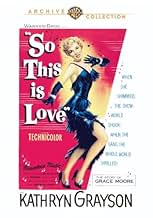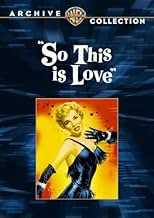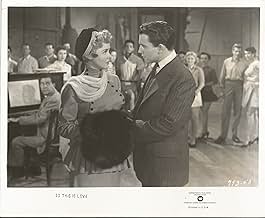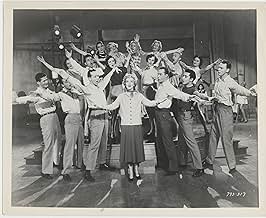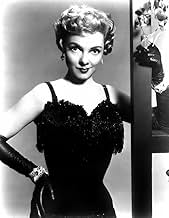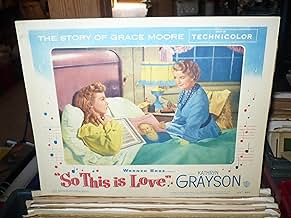CALIFICACIÓN DE IMDb
6.0/10
282
TU CALIFICACIÓN
Biografía de la gran soprano Grace Moore, cuya magnífica carrera operística se vio truncada prematuramente por su muerte en un accidente aéreo.Biografía de la gran soprano Grace Moore, cuya magnífica carrera operística se vio truncada prematuramente por su muerte en un accidente aéreo.Biografía de la gran soprano Grace Moore, cuya magnífica carrera operística se vio truncada prematuramente por su muerte en un accidente aéreo.
- Dirección
- Guionista
- Elenco
John Alban
- Opera Spectator
- (sin créditos)
Bill Alcorn
- Backstage Performer
- (sin créditos)
Jerry Antes
- Chorus Boy
- (sin créditos)
William Bakewell
- Charles, Waiter
- (sin créditos)
- Dirección
- Guionista
- Todo el elenco y el equipo
- Producción, taquilla y más en IMDbPro
Opiniones destacadas
Before I began watching "So This is Love", I read through the IMDB reviews. One struck me when it essentially said that the way they portrayed Grace Moore made her difficult to like. Well, I did some reading and after realizing much of the film is rather fictional (no surprise given when it was made), Ms. Moore as played by Kathryn Grayson is actually reasonably close to the real thing when it comes to behaving like a diva. She was, apparently, rather difficult to like and was abrasive and was known for her foul language. So, at least in this sense, I think the movie actually makes Moore seem pretty good.
So am I saying it's a good biopic about the opera star, Grace Moore? Not especially. I saw two big problems. First, the film only goes up to Moore's successful performance at the Met in the early 1920s. She didn't die until well over two decades later and we learn nothing about this part of her life . Second, the film sure seemed like a showcase for Grayson than a biopic. It was chocked full of musical numbers and a few dance numbers...when instead the film should have concentrated more on letting us know who Moore was.
Overall, this is a slick looking film chock full of Grayson production numbers. On this level, it works if you like that sort of thing. But its shallow treatment of Moore makes you wish a really good biopic could be made about her and her up and down career.
So am I saying it's a good biopic about the opera star, Grace Moore? Not especially. I saw two big problems. First, the film only goes up to Moore's successful performance at the Met in the early 1920s. She didn't die until well over two decades later and we learn nothing about this part of her life . Second, the film sure seemed like a showcase for Grayson than a biopic. It was chocked full of musical numbers and a few dance numbers...when instead the film should have concentrated more on letting us know who Moore was.
Overall, this is a slick looking film chock full of Grayson production numbers. On this level, it works if you like that sort of thing. But its shallow treatment of Moore makes you wish a really good biopic could be made about her and her up and down career.
This seems to be fairly accurate as a biopic. certainly, the sequence where Grace Moore's vocal trauma was dealt with appeared to follow the events and treatment described in You're Only Human Once, Moore's autobiography.
1953 was a year in which two American singers starred in filmed tributes to stars of earlier times: Patrice Munsel played the title role in the British production of Melba, and Kathryn Grayson made a convincing and entertaining Grace Moore for Warners.
So This Is Love is a film that many people may find enjoyable, and seems to have been a worthy attempt by both the star and the studio to pay their sincere respects to Grace Moore, herself an outstanding figure in stage and film work. Hopefully it may soon be available on DVD or whatever the new formats may be.
1953 was a year in which two American singers starred in filmed tributes to stars of earlier times: Patrice Munsel played the title role in the British production of Melba, and Kathryn Grayson made a convincing and entertaining Grace Moore for Warners.
So This Is Love is a film that many people may find enjoyable, and seems to have been a worthy attempt by both the star and the studio to pay their sincere respects to Grace Moore, herself an outstanding figure in stage and film work. Hopefully it may soon be available on DVD or whatever the new formats may be.
I saw this film many years ago and would love to see it again. I also wish it were available in DVD. It is the true story of Grace Moore, who was born in Tennessee in 1898. She was a singer of Broadway musicals, an opera star, and a lovely lady Florenz Ziegfeld described as "the most beautiful woman in the world." Tragically, Miss Moore was killed in a plane crash in Copenhagen, Denmark, in January 1947. Also on board was a member of the Danish royal family. In the nearly six decades after her death, Miss Moore's talent lives on in the recordings of her music.
I hope this film will be appreciated by today's young people and that they will learn valuable lessons from it.
I hope this film will be appreciated by today's young people and that they will learn valuable lessons from it.
MGM scored a big and rather unexpected hit in 1951 with *The Great Caruso*, their very fictionalized bi op of the great Neapolitan tenor. The success was the result of several features, such as a good mix of recognizable operatic numbers and well-known Neapolitan songs. But the real winning card was Mario Lanza as Caruso. Himself the product of the poor Italian neighborhoods of South Philly, with a build like a stevedore that made him look like "a real guy" to Americans of all classes, Lanza was perfect for making a larger-than-life individual come across on screen bursting with life.
Warner Brothers could therefore be forgiven for trying to do the same thing with the American soprano Grace Moore. Moore had been a success on Broadway for a few years, then had a good if not stellar career at the Met. But it was with movies like *One Night of Love* (1934), *When You're in Love* (1937), and *I'll Take Romance* (1937), along with a lot of appearances on the radio, that Moore entered the general popular consciousness, in part because she was a good singer, in part because she was a fearless, vivacious lady in an era when most opera stars, and even many female movie stars, were still intent on being seen as "ladies." Just as Caruso was famous for (being accused of) pinching a lady in the monkey house at the zoo, Moore, to some of the same extent, crossed the line from the world of classical music to the world of Joe and Jane Smith.
It would therefore have made sense to focus on this aspect of Moore's life and career in a movie about her that was being marketed to a general audience.
For whatever reason, Warner Brothers did not do this.
Instead, this movie focuses on Moore's career up until her arrival at the Met, and does not make any effort to suggest that she was "a wild and crazy lady." (You wouldn't hire Kathryn Grayson for that, anyway.) We get a paint-by-the-numbers story of an almost uninterrupted rise to success, and it isn't interesting.
Nor, as others point out, do we get much of the popular music that was associated with Moore. Her one performance of Ciriciribin gets interrupted before the last high note, which is what Moore had been famous for. (It's even referenced in *Funny Woman*.)
There's also another problem with this movie: it is the story of a woman who put career before love and family, but then doesn't do much with that. For American audiences in 1953, that was still a fairly radical theme, and should have been developed a lot more carefully.
There are all sorts of other, lesser problems. It is very antiseptic. The movie starts off when Moore is a child in Tennessee, but NO ONE speaks with even a hint of a Southern accent. Later, Moore sings with the great Irish tenor John McCormack, but he neither speaks nor sings with an Irish accent.
In general, the film looks cheaply made, the way Warner Brothers' 1952 April in Paris looks cheap after MGM's lavish 1951 An American in Paris. (April in Paris is still a lot better movie than this, though, thanks in large part to better music and Doris Day.)
If you want to learn about Grace Moore, read her entertaining autobiography *You're Only Human Once*. (I think there's also a biography, but I can't remember the title and couldn't find it on amazon.com) This movie makes her seem boring, and that is one adjective that no one who remembered her from when she was popular would associate with her.
Warner Brothers could therefore be forgiven for trying to do the same thing with the American soprano Grace Moore. Moore had been a success on Broadway for a few years, then had a good if not stellar career at the Met. But it was with movies like *One Night of Love* (1934), *When You're in Love* (1937), and *I'll Take Romance* (1937), along with a lot of appearances on the radio, that Moore entered the general popular consciousness, in part because she was a good singer, in part because she was a fearless, vivacious lady in an era when most opera stars, and even many female movie stars, were still intent on being seen as "ladies." Just as Caruso was famous for (being accused of) pinching a lady in the monkey house at the zoo, Moore, to some of the same extent, crossed the line from the world of classical music to the world of Joe and Jane Smith.
It would therefore have made sense to focus on this aspect of Moore's life and career in a movie about her that was being marketed to a general audience.
For whatever reason, Warner Brothers did not do this.
Instead, this movie focuses on Moore's career up until her arrival at the Met, and does not make any effort to suggest that she was "a wild and crazy lady." (You wouldn't hire Kathryn Grayson for that, anyway.) We get a paint-by-the-numbers story of an almost uninterrupted rise to success, and it isn't interesting.
Nor, as others point out, do we get much of the popular music that was associated with Moore. Her one performance of Ciriciribin gets interrupted before the last high note, which is what Moore had been famous for. (It's even referenced in *Funny Woman*.)
There's also another problem with this movie: it is the story of a woman who put career before love and family, but then doesn't do much with that. For American audiences in 1953, that was still a fairly radical theme, and should have been developed a lot more carefully.
There are all sorts of other, lesser problems. It is very antiseptic. The movie starts off when Moore is a child in Tennessee, but NO ONE speaks with even a hint of a Southern accent. Later, Moore sings with the great Irish tenor John McCormack, but he neither speaks nor sings with an Irish accent.
In general, the film looks cheaply made, the way Warner Brothers' 1952 April in Paris looks cheap after MGM's lavish 1951 An American in Paris. (April in Paris is still a lot better movie than this, though, thanks in large part to better music and Doris Day.)
If you want to learn about Grace Moore, read her entertaining autobiography *You're Only Human Once*. (I think there's also a biography, but I can't remember the title and couldn't find it on amazon.com) This movie makes her seem boring, and that is one adjective that no one who remembered her from when she was popular would associate with her.
If Grace Moore were still alive I'm sure she'd have been pleased that she was tributed by another great soprano in the person of Kathryn Grayson. But she'd probably wonder where are all the songs that she made famous.
Probably because the two American studios that she worked for, first MGM and then Columbia held all the copyrights and Jack Warner wasn't about to shell out some big bucks for One Night Of Love, Love Me Forever and I'll Take Romance for his film. It makes me wonder why his studio chose Grace Moore as the subject of a biographical film.
The problem was somewhat solved by taking her story up to 1928, the year she made her Metropolitan Opera debut. All these songs were in the future. But they also managed to select a list of popular songs that she wasn't identified with at all. I did a bit of research on the subject and confirmed it. The only song that Grayson sings in So This Is Love that is both not operatic and identified with Grace Moore is Ciribiribin, cheerfully for Jack Warner in the public domain.
The story we get as far as it goes is that of young Grace Moore, born in Slabtown, raised in Jellico, Tennessee who had a burning ambition to sing. Nothing stood in her way and we see a few broken hearts like Merv Griffin's and Douglas Dick's left by the wayside. What's not shown here is that Grace Moore was every inch southern born and bred and that includes a few negatives I think you can figure out.
What Grace Moore was however was one of the greatest entertainers of the 20th century. She conquered five mediums, the musical stage, grand opera, recordings, radio, and film. The last three get no mention at all. She was the most popular selling classical artist between Enrico Caruso and Mario Lanza on record, she was a Hollywood star as I said before later in her career, and she appeared numerous times on radio on the Bell Telephone Hour. Not touching on any of that in So This Is Love does Moore an injustice.
Her life story would make a compelling film if the real story were told and maybe Columbia could do it and dub her voice to a current actress. There are surely none around like Kathryn Grayson who could actually sing those songs.
Probably because the two American studios that she worked for, first MGM and then Columbia held all the copyrights and Jack Warner wasn't about to shell out some big bucks for One Night Of Love, Love Me Forever and I'll Take Romance for his film. It makes me wonder why his studio chose Grace Moore as the subject of a biographical film.
The problem was somewhat solved by taking her story up to 1928, the year she made her Metropolitan Opera debut. All these songs were in the future. But they also managed to select a list of popular songs that she wasn't identified with at all. I did a bit of research on the subject and confirmed it. The only song that Grayson sings in So This Is Love that is both not operatic and identified with Grace Moore is Ciribiribin, cheerfully for Jack Warner in the public domain.
The story we get as far as it goes is that of young Grace Moore, born in Slabtown, raised in Jellico, Tennessee who had a burning ambition to sing. Nothing stood in her way and we see a few broken hearts like Merv Griffin's and Douglas Dick's left by the wayside. What's not shown here is that Grace Moore was every inch southern born and bred and that includes a few negatives I think you can figure out.
What Grace Moore was however was one of the greatest entertainers of the 20th century. She conquered five mediums, the musical stage, grand opera, recordings, radio, and film. The last three get no mention at all. She was the most popular selling classical artist between Enrico Caruso and Mario Lanza on record, she was a Hollywood star as I said before later in her career, and she appeared numerous times on radio on the Bell Telephone Hour. Not touching on any of that in So This Is Love does Moore an injustice.
Her life story would make a compelling film if the real story were told and maybe Columbia could do it and dub her voice to a current actress. There are surely none around like Kathryn Grayson who could actually sing those songs.
¿Sabías que…?
- TriviaKathryn Grant's film debut.
- ErroresGrace's hometown is misspelled "Jellicoe" instead of "Jellico." While this mistake has been made over many decades by many others, you'd think someone in a biopic production would at least make a phone call or check a map to get it right.
Selecciones populares
Inicia sesión para calificar y agrega a la lista de videos para obtener recomendaciones personalizadas
Detalles
- Tiempo de ejecución
- 1h 41min(101 min)
- Relación de aspecto
- 1.37 : 1
Contribuir a esta página
Sugiere una edición o agrega el contenido que falta

